Sir Antony Sher obituary
As breakthrough performances go, Antony Sher’s as Richard III at Stratford-upon-Avon in June 1984 was beyond astounding. He gatecrashed this play’s performance history and threw down an audacious gauntlet to the hallowed shades of Edmund Kean, Henry Irving, Laurence Olivier and, on that same Stratford stage, Ian Holm.
Just as Irving’s bells stopped ringing on “the lascivious pleasing of a lute” in the opening soliloquy, so did Sher’s background music, and he instantly produced, with an obscene flourish, a pair of black medical crutches, resuming the speech with two swinging, ape-like hops to the front of the stage, an unforgettable creepy arachnoid.
That, in a lesser actor, might have been that. But Sher, who has died aged 72, developed this spitefully animated cartoon into a complicated study of pathology, unctuousness and glistening malevolence way beyond anything revealed in the role, arguably, before or since. In Year of the King, the first of his many books, Sher told the story of Bill Alexander’s RSC production, accompanied by a plethora of remarkable drawings – he was a fine artist, an accomplished writer and an indisputably great actor.
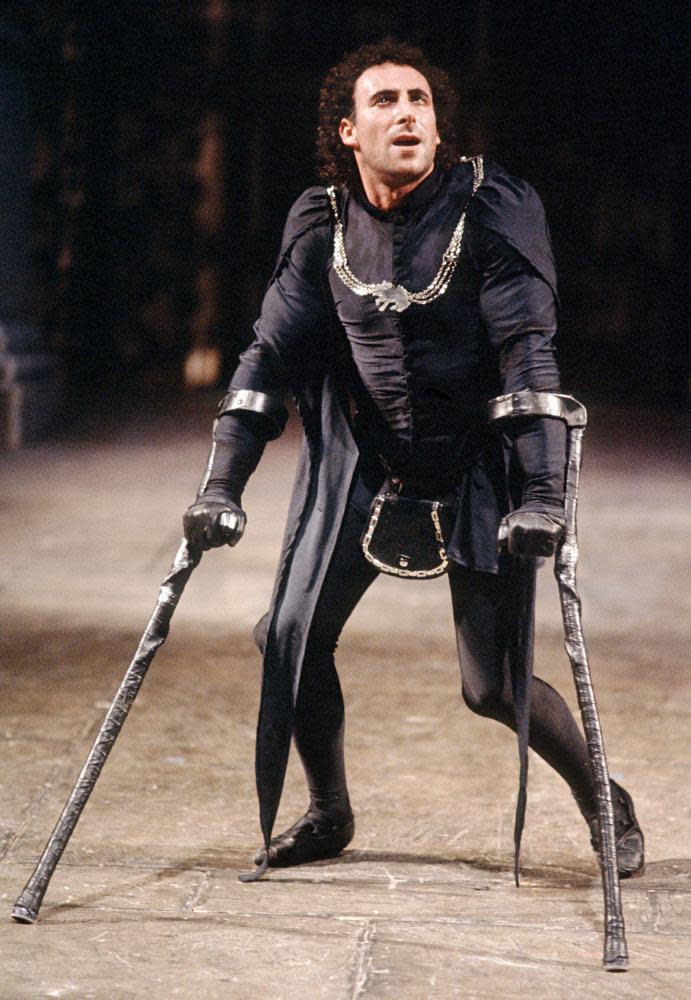
And, as with all great actors, there were areas of critical dispute, of “going too far” or of “hogging the stage”. You could equally argue that there is far too little of that sort of thing in the theatre these days, and more’s the pity. Sher was a great admirer of Steven Berkoff, in whose expressionist, balletic adaptation of Kafka’s The Trial he appeared as a bespectacled Joseph K at the National Theatre in 1991; in the same season, he referenced his RSC crutches by surging manically down stage on a pair of upended tommy guns as Brecht’s Arturo Ui, for which Shakespeare’s hunchbacked toad was a prototype.
Most of his career was at the RSC after he joined in 1982 to play a capering, clownish Fool to Michael Gambon’s mighty King Lear. He stole a few notices there, too, and allegedly had to be reminded by Gambon that Shakespeare’s play was called King Lear, not “King Lear plus a cunt in a red nose”. He was the first Fool ever killed on stage by his master; not without feeling, one imagined, this act of smother-love.
Richard was followed by a flurry of extraordinary performances rooted in Sher’s innate sense of not-quite-belonging as a gay, Jewish South African. In some ways you could see that his long struggle with his own identity paid off more than handsomely in a savagely embittered Shylock, a Greek Orthodox-style Malvolio, a murderous, full-throttle Vindice in The Revenger’s Tragedy and a grubby, unpleasantly perverse Iago to the refined South African Othello of Sello Maake ka-Ncube in 2004. Recrimination and vengeance were his forte.
He was less successful as Falstaff, and perhaps saw with hindsight the wisdom of Olivier in never having played the role. But he strode magnificently through The Winter’s Tale as Leontes; as Macbeth (opposite Harriet Walter, the best RSC pairing since Ian McKellen and Judi Dench in 1976), both of these in 1998-99; as a wizened old Prospero (2009) in another pertinent South African reimagining; and finally as King Lear (2016), appearing first enthroned in a glass cage, swathed in furs, prone to violent mood swings and, said Michael Billington, “unbearably moving” with David Troughton’s blinded Gloucester on the Dover cliff. He was a marvellous Willy Loman, too (Walter, again, as his stoically forbearing wife), in Arthur Miller’s tragedy Death of a Salesman (2015).
Sher’s grandparents were Russian Jews who emigrated to Cape Town, where he grew up insulated against the injustices of apartheid. His father, Emmanuel Sher, was an exporter dealing in animal skins and hides, and he remained particularly close to his mother, Margery, who encouraged and enjoyed his success.
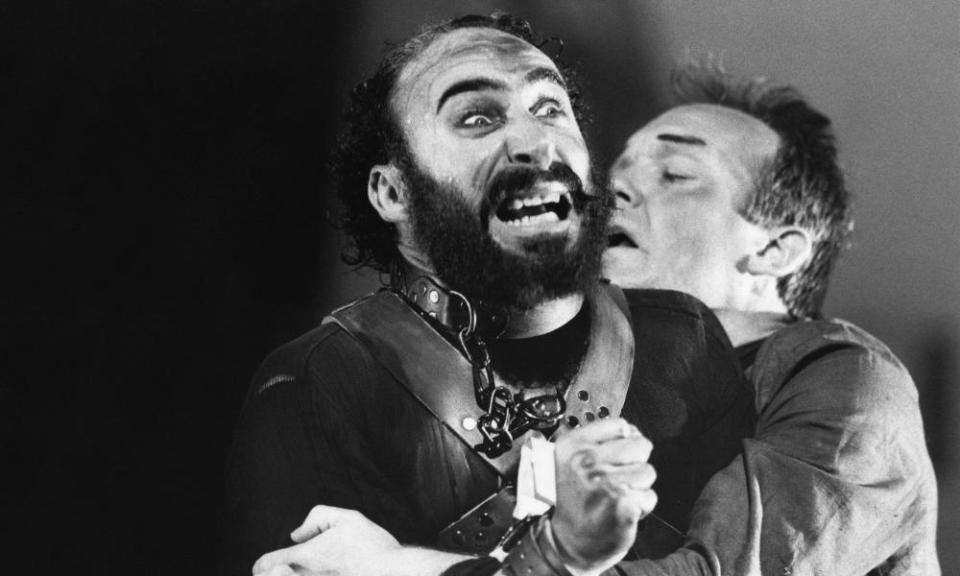
Along with his two brothers and sister, he was well educated – at Sea Point boys’ junior and high schools in Cape Town – and the household had black servants. From the beach at Sea Point he could see Robben Island, where Nelson Mandela was incarcerated.
After his compulsory year in the South African army, he came to the UK – it was reading the monthly magazine Plays and Players that ignited his theatrical ambitions – and he took a BA acting course at Manchester University, where he was briefly married to an American fellow student. He trained at Webber Douglas – other London drama schools rejected him – from 1969 to 1971, and plunged into repertory theatres in Liverpool, Nottingham and Edinburgh.
At the Liverpool Everyman, where I first saw him, he played Ringo Starr in Willy Russell’s John, Paul, George, Ringo … and Bert (1974). Then he donned a leopardskin as Enoch Powell in Tarzan’s Last Stand, a withering and unnerving impersonation. This now legendary Everyman company – the theatre had been co-founded in 1964 by the director Terry Hands, who would become Sher’s key mentor at the RSC – included Julie Walters, Alison Steadman, Bill Nighy and Jonathan Pryce.
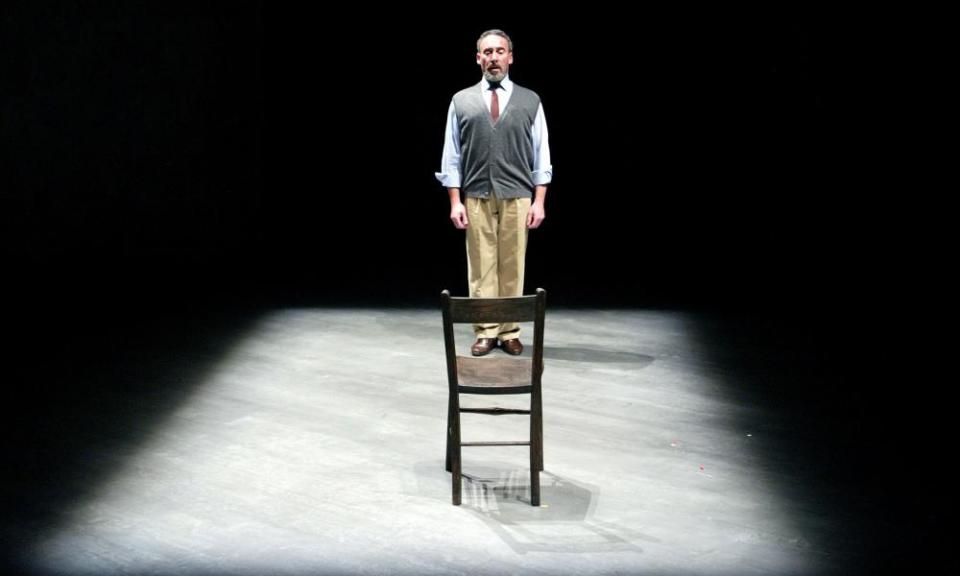
He blossomed further in the London new plays explosion of the 1970s, notably with the pioneering company Gay Sweatshop alongside his friend and rival Simon Callow, and in significant early pieces by David Hare (Teeth ’n’ Smiles, 1975, with Helen Mirren and a rock band) and Caryl Churchill (Cloud Nine, 1979, with Julie Covington, Miriam Margolyes and Jim Hooper) at the Royal Court. He was in a partnership of 17 years with Hooper, who featured in Characters, his 1989 sketchbook of favourite performers and performances.
Sher achieved an early prominence on television as the leering, lecherous academic Howard Kirk in Malcolm Bradbury’s The History Man in 1981 (in line with the 70s setting, Sher sported kipper ties, flares and an afro haircut) and followed through on stage in Mike Leigh’s hilarious Goose-Pimples (1981) at the Hampstead theatre and the Garrick; his character was a small-time entrepreneur who mistakenly thinks he’s arrived in a brothel in Dollis Hill, north London, when he fetches up with a nightclub croupier (Marion Bailey) whose landlord is a house-proud car salesman (Jim Broadbent).
When he collected several theatre awards in 1985, Sher said he was proud to be nominated as both king and queen in the same year: Richard III and Arnold Beckoff, the drag queen hero of Harvey Fierstein’s Torch Song Trilogy at the Albery (now the Noël Coward), to whom he lent a restrained, almost melancholic, suburban glamour.
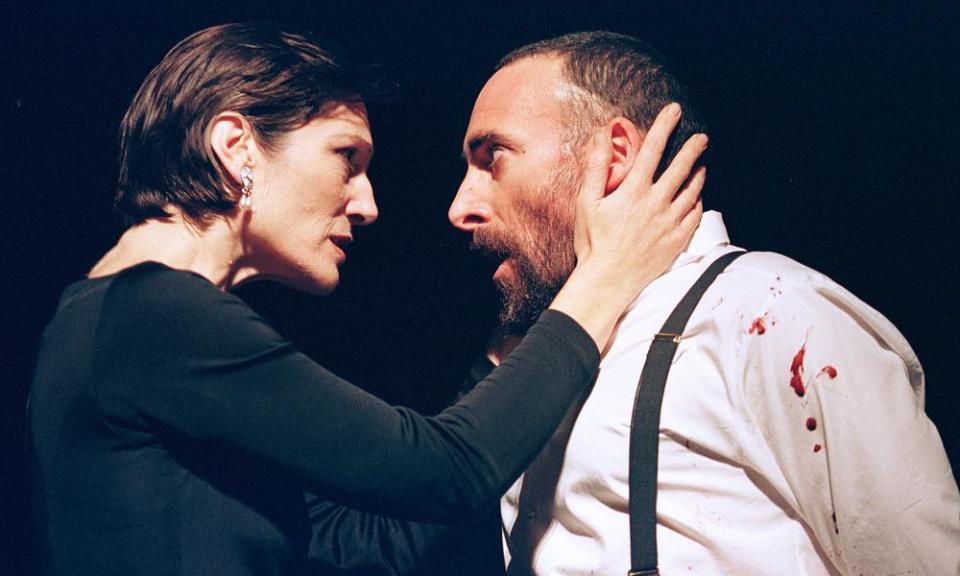
He was now increasingly interjecting his classical triumphs – a barbaric and overweening Titus Andronicus co-presented by the Market theatre in Johannesburg and the National (1995), a tremendous, moving Cyrano de Bergerac at the RSC (1997), using the Anthony Burgess translation – with some telling adventures in the contemporary repertoire.
For the RSC, he played leads in David Edgar’s Maydays (charting the classic journey of leftwing agitators moving rightwards), Peter Barnes’s farcical medieval pandemic epic Red Noses and, the first contemporary play in the new Swan at Stratford in 1989, Peter Flannery’s Singer, a furious caricature of the 60s London landlord Peter Rachman. Later, in 1997, he delivered one of his sweetest, most obsessional performances as the painter Stanley Spencer, the priapic mystic of Cookham, in a play by Pam Gems at the National.
By then he had kicked a self-confessedly serious cocaine habit. He went into a rehab clinic in 1996, supported by his partner, the RSC director Gregory Doran, whom he had met when they first worked together in Stratford in 1987.
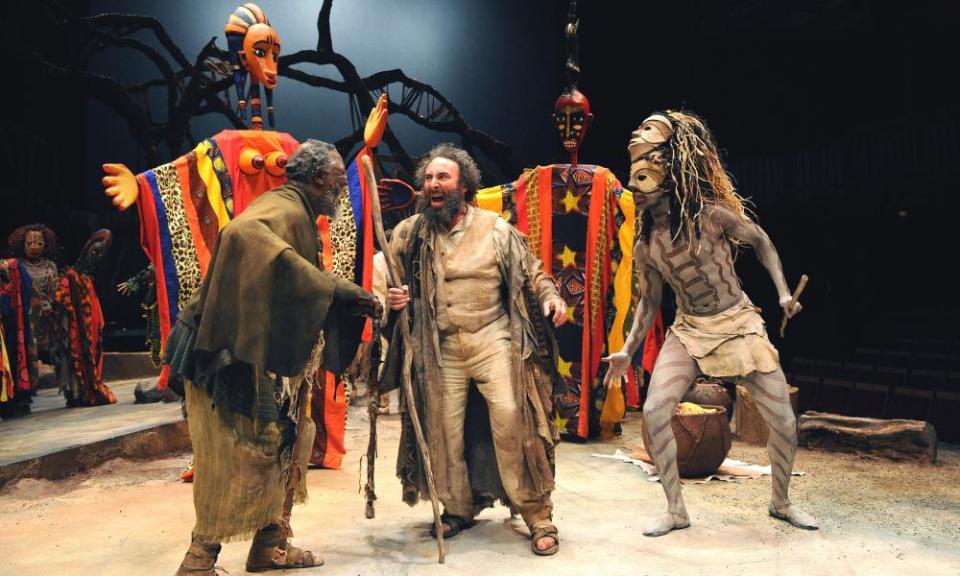
The first, and most acclaimed, of Sher’s several novels, Middlepost (1988), was a fictional saga of his grandfather’s journey from the Russian shtetl to South Africa. Part critical love affair, part exorcism, his relationship with his home country seeped further into his work with every passing year. His first play, I.D., at the Almeida in London in 2003, was about the assassination of Dr Hendrik Verwoerd, the South African prime minister and architect of apartheid, by a Greek Mozambican immigrant in 1966.
Two other plays reflected his passion and commitment to politics and aesthetics: Primo (2004), a one-man show for himself set in Auschwitz and based on the writings of Primo Levi; and The Giant (2008), which fascinatingly fictionalised a struggle between Michelangelo (John Light) and Leonardo da Vinci (Roger Allam) over the commission for the David statue in Florence, with their mutual apprentice a catalytic agent in Renaissance gay culture.
His film career was virtually nonexistent, though he was an excellent Benjamin Disraeli in Dench’s belated breakthrough movie, John Madden’s Mrs Brown (1997), and popped up as Dr Moth in Shakespeare in Love (1998) and as Adolf Hitler in Peter Richardson’s ribald spoof Churchill: The Hollywood Years (2004).
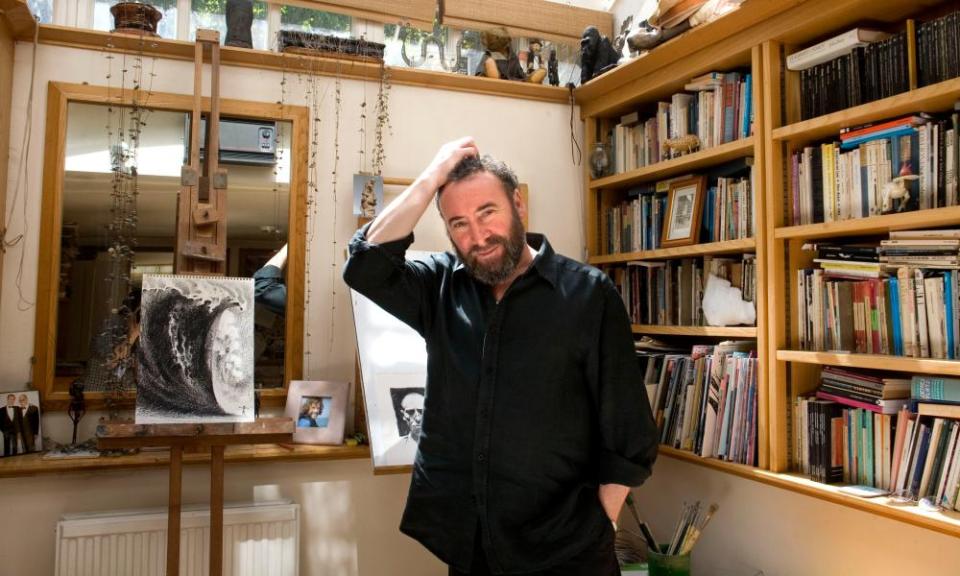
Sher worked with Doran as his director at every opportunity, before and after the latter succeeded Michael Boyd as the RSC’s artistic director in 2012. They formed a civil partnership in 2005 and were married in 2015, sharing homes in Islington, north London, and outside Stratford-upon-Avon.
Sher’s last stage appearance in Stratford-upon-Avon, in April 2019, was as a bibulous old thespian with terminal liver cancer cared for by a black South African nurse – played by John Kani, the play’s author. Kunene and the King, a co-production by the RSC and the Fugard theatre in Cape Town, was directed by Janice Honeyman. Its transfer to the West End in January 2020 was closed by the pandemic two months later.
Sher was knighted in 2000, and held honorary doctorates from the universities of Liverpool, Warwick and Cape Town.
He is survived by Doran.
• Antony Sher, actor, writer and artist, born 14 June 1949; died 2 December 2021

 Yahoo Finance
Yahoo Finance 